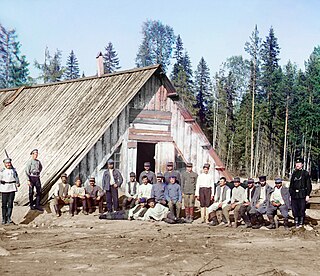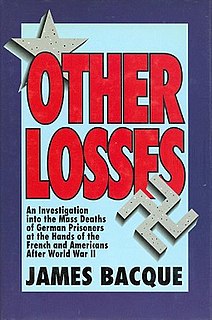
The Korean War was a war fought between North Korea and South Korea from 1950 to 1953. The war began on 25 June 1950 when North Korea invaded South Korea following clashes along the border and rebellions in South Korea. North Korea was supported by China and the Soviet Union while South Korea was supported by the United Nations, principally the United States. The fighting ended with an armistice on 27 July 1953.

A prisoner of war (POW) is a person who is held captive by a belligerent power during or immediately after an armed conflict. The earliest recorded usage of the phrase "prisoner of war" dates back to 1610.

Other Losses is a 1989 book by Canadian writer James Bacque, which makes the claim that U.S. General Dwight D. Eisenhower intentionally caused the deaths by starvation or exposure of around a million German prisoners of war held in Western internment camps after the Second World War. Other Losses charges that hundreds of thousands of German prisoners that had fled the Eastern front were designated as "Disarmed Enemy Forces" in order to avoid recognition under the Geneva Convention (1929), for the purpose of carrying out their deaths through disease or slow starvation. Other Losses cites documents in the U.S. National Archives and interviews with people who stated they witnessed the events. The book claims that a "method of genocide" was present in the banning of Red Cross inspectors, the returning of food aid, soldier ration policy, and policy regarding shelter building.
James Follett was an English author and screenwriter. Follett became a full-time fiction writer in 1976, after resigning from contract work as a technical writer for the Ministry of Defence. He wrote over 20 novels, several television plays and many radio dramas.

Missing in action (MIA) is a casualty classification assigned to combatants, military chaplains, combat medics, and prisoners of war who are reported missing during wartime or ceasefire. They may have been killed, wounded, captured, executed, or deserted. If deceased, neither their remains nor grave has been positively identified. Becoming MIA has been an occupational risk for as long as there has been warfare.
The Defense Prisoner of War/Missing Personnel Office (DPMO), as part of the United States Department of Defense, was an organization that reported to the Under Secretary of Defense for Policy through the Assistant Secretary of Defense. DPMO provided centralized management of prisoner of war/missing personnel (POW/MP) affairs within the Department of Defense.

Dwight D. Eisenhower's tenure as the 34th president of the United States began on his inauguration on January 20, 1953, and ended on January 20, 1961. Eisenhower, a Republican, took office as president following his victory over Democrat Adlai Stevenson in the 1952 presidential election. John F. Kennedy succeeded him after winning the 1960 presidential election.
The U.S.–Russia Joint Commission on POWs/MIAs (USRJC) was established in 1992 by the presidents of the United States and the Russian Federation, George H. W. Bush and Boris Yeltsin. The USRJC was established to determine the fates of the United States's and the Soviet Union's unaccounted-for service personnel from World War II, the Korean War, the Cold War, Afghanistan and the Vietnam War, Laos and Cambodia.
The Senate Select Committee on POW/MIA Affairs was a special committee convened by the United States Senate during the George H. W. Bush administration to investigate the Vietnam War POW/MIA issue, that is, the fate of United States service personnel listed as missing in action during the Vietnam War. The committee was in existence from August 2, 1991 to January 2, 1993.
The Vietnam War POW/MIA issue concerns the fate of United States servicemen who were reported as missing in action (MIA) during the Vietnam War and associated theaters of operation in Southeast Asia. The term also refers to issues related to the treatment of affected family members by the governments involved in these conflicts. Following the Paris Peace Accords of 1973, 591 U.S. prisoners of war (POWs) were returned during Operation Homecoming. The United States listed about 2,500 Americans as prisoners of war or missing in action but only 1,200 Americans were reported to have been killed in action with no body recovered. Many of these were airmen who were shot down over North Vietnam or Laos. Investigations of these incidents have involved determining whether the men involved survived being shot down. If they did not survive, then the U.S. government considered efforts to recover their remains. POW/MIA activists played a role in pushing the U.S. government to improve its efforts in resolving the fates of these missing service members. Progress in doing so was slow until the mid-1980s when relations between the United States and Vietnam began to improve and more cooperative efforts were undertaken. Normalization of the U.S. relations with Vietnam in the mid-1990s was a culmination of this process.
Tens of thousands of South Korean soldiers were captured by North Korean and Chinese forces during the Korean War (1950–1953) but were not returned during the prisoner exchanges under the 1953 Korean Armistice Agreement. Most are presumed dead, but the South Korean government estimated in 2007 that some 560 South Korean prisoners of war (POWs) still survived in North Korea. The issue of unaccounted South Korean POWs from the Korean War has been in dispute since the 1953 armistice. North Korea continues to deny that it holds these South Korean POWs. Interest in the issue has been renewed since 1994, when Cho Chang-ho, a former South Korean soldier presumed to have been killed in the war, escaped from North Korea. As of 2008, 79 former South Korean soldiers had escaped from North Korea.

Many films, books, and other media have depicted the Korean War in popular culture. The TV series M*A*S*H is one well known example. The 1959 novel The Manchurian Candidate has twice been made into films. The 1982 film Inchon about the historic battle that occurred there in September 1950 was a financial and critical failure. By 2000 Hollywood alone had produced 91 feature films on the Korean War. Many films have also been produced in South Korea and other countries as well.

Donald Mitchell Brown, Jr. is an American author and attorney, and former United States Navy JAG Officer. He has published eleven military-genre novels, the best known of which is Treason (2005) in which radical Islamic clerics infiltrate the United States Navy Chaplain Corps. He has published three works of military nonfiction, including his national bestseller, The Last Fighter Pilot: The True Story of the Final Combat Mission of World War II (2017). Brown may be best known for his work as legal counsel to Army Lieutenant Clint Lorance, and his authorship of the 2019 book Travesty of Justice: The Shocking Prosecution of Lt. Clint Lorance. On November 15, 2019, President Donald Trump pardoned Lorance, and the book is considered to be a major factor in leading to that pardon. Between the release of Travesty of Justice on March 31, 2019, and Lorance's pardon on November 15, 2019, Brown made numerous national television appearances and penned a number of national Op-eds arguing that President Trump should free and exonerate Lieutenant Lorance. On the Wednesday night before Thanksgiving, November 27, 2019, Brown and Lorance appeared on Hannity, the nightly national broadcast on the Fox News Channel to discuss the presidential pardon and release.
Americans in North Korea consist mainly of defectors and prisoners of war during the Korean War as well as their locally born descendants.

The military history of the United States during the Korean War began in the context of the defeat of Japan by the Allied Powers in World War II which heralded the end to 35 years of Japanese occupation of the Korean Peninsula and led to the peninsula being divided into two zones; a northern zone occupied by the Soviet Union and a southern zone occupied by the United States. After negotiations on reunification failed, the latter became the Republic of Korea or South Korea in August 1948 while the former became the Democratic People's Republic of Korea or North Korea in September 1948.

The United Nations Memorial Cemetery in Korea, located at Tanggok in the Nam District, City of Busan, Republic of Korea, is a burial ground for United Nations Command (UNC) casualties of the Korean War. It contains 2,300 graves and is the only United Nations cemetery in the world. Laid out over 14 hectares, the graves are set out in 22 sites designated by the nationalities of the buried servicemembers.
The Pacific Rim series consists of three action thriller novels, authored by Don Brown and published by Zondervan, and its parent publishing company, HarperCollins between 2011 and 2014. The novels, naval military action thrillers, are Thunder in the Morning Calm, Fire of the Raging Dragon, and Storming the Black Ice. The novels feature modern-day military crises involving the U.S. Navy erupting around the Pacific Rim.

Fire of the Raging Dragon is a 2012 political thriller novel written by Don Brown. The novel explores the international political tension in disputed waters of the South China Sea.

The recovery of US human remains from the Korean War has continued since the end of the war.











